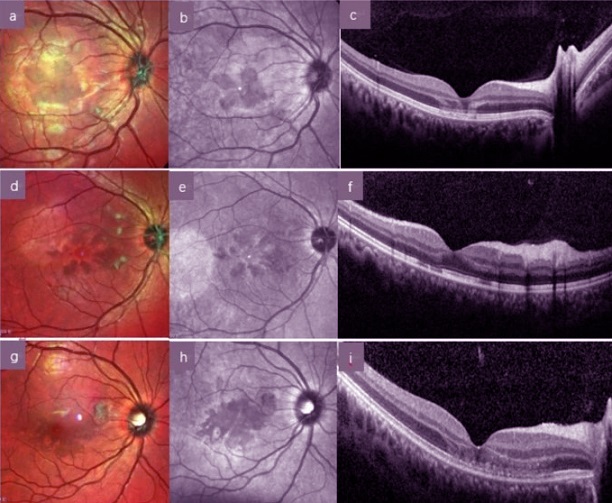Nikhil Prasad Fact checked by:Thailand Medical News Team Nov 16, 2024 1 year, 1 month, 1 week, 2 days, 20 hours, 29 minutes ago
Medical News: Emerging Link Between COVID-19 and Eye Health
A groundbreaking study conducted by researchers from the Henan Provincial People’s Hospital, Henan Eye Hospital, and People’s Hospital of Zhengzhou University in China has uncovered alarming evidence about how COVID-19 infection affects eye health. The study examined 48 patients who experienced acute visual impairments shortly after contracting the virus. These individuals were observed between December 2022 and February 2023, highlighting a concerning trend in ophthalmological complications related to COVID-19.
 Visual Complications Linked to COVID-19 Infection
Visual Complications Linked to COVID-19 Infection
(a) Multicolor imaging (MCI): Petal-like deep red changes in the macular area. (b). IR (Infrared): Petal-like low reflective signal in the macular area. (c). OCT (Optical Coherence Tomography): High reflective signals in the outer plexiform and outer nuclear layers. (d)MCI: Wedge-shaped deep red changes in the macular area. (e)IR: Wedge-shaped low reflective signal in the macular area. (f)OCT: High reflective signal in the outer plexiform layer; cotton wool spots corresponding to high reflective signal in the nerve fiber layer. (g)MCI: Patchy deep red changes in the macular area. (h)IR: Patchy low reflective signal in the macular area. (i)OCT: High reflective signal in the outer nuclear layer; irregular reflective signal in the ellipsoid zone.
This
Medical News report dives into the study's findings, which provide detailed insight into the eye conditions caused by the virus. The findings could have significant implications for the broader understanding of COVID-19’s systemic impacts.
How COVID-19 Impacts Vision
The study focused on patients with bilateral visual dysfunction, all of whom showed distinct patterns of retinal damage. Researchers conducted comprehensive eye examinations using advanced imaging techniques such as multicolor imaging (MCI), infrared autofluorescence (IR), optical coherence tomography (OCT), and fundus fluorescein angiography (FFA).
The most common finding was hyperreflective signals in the macula, a part of the retina responsible for central vision. All 96 eyes in the study exhibited these abnormalities. Furthermore, 68.8% of eyes displayed disturbances in the ellipsoid and interdigitation zones, critical layers of the retina.
Key Symptoms Observed in Patients
Patients in this study, who ranged in age from 14 to 46 years (average age 32), reported experiencing symptoms such as blurred vision and central vision distortions within days of their COVID-19 diagnosis. The majority of patients developed these symptoms within three days of testing positive for the virus. Interestingly, 81.3% of the patients had been vaccinated, but this did not seem to prevent the onset of visual symptoms.
Other significant observations included:
-Cotton-wool spots: Found in 56.3% of eyes, these lesions indicate
localized retinal ischemia.
-Macular abnormalities: Nearly half of the patients displayed petaloid or wedge-shaped patterns in the macula, consistent with acute macular neuroretinopathy (AMN).
-Retinal hemorrhages: Present in 19.8% of eyes, further highlighting the vascular impact of the virus.
Understanding Acute Macular Neuroretinopathy (AMN)
Acute macular neuroretinopathy was a prominent finding in this study, particularly among young women. AMN is characterized by reddish-brown lesions in the macula, accompanied by paracentral scotomas (partial loss of vision near the central field).
The researchers suggest that the condition arises from damage to the deep retinal capillary network, possibly due to the inflammatory and vascular effects of COVID-19. OCT scans revealed distinct hyperreflective bands in the retinal layers, a hallmark of AMN. Over time, these lesions may partially recover, but patients could face lingering visual impairment.
Mechanisms Behind Retinal Damage
The retinal damage observed in the study could be attributed to several factors:
-ACE2 Receptor Expression: The retina contains cells with ACE2 receptors, which the virus uses to invade tissues. This could explain the direct impact of COVID-19 on the retina.
-Vascular Complications: COVID-19’s effect on blood clotting and vascular inflammation may lead to retinal ischemia and subsequent damage.
-Choroidal Blood Flow Disorders: The virus may disrupt the oxygen and nutrient supply to the retina, exacerbating retinal injury.
The study also noted optic disc edema and macular edema in some patients, which could result from inflammation, immune responses, or hypoxia caused by the virus.
Conclusions and Broader Implications
The findings of this study underscore the multifaceted impact of COVID-19 on the human body, extending beyond the respiratory system to include critical sensory functions. Visual impairment in these cases was found to be bilateral, acute, and relatively symmetric. The study highlights the importance of early detection and monitoring for ophthalmic complications in COVID-19 patients, particularly those experiencing systemic symptoms or vascular issues.
In terms of clinical relevance, the study calls for heightened awareness among healthcare providers regarding these complications. Advanced imaging tools like OCT and MCI can be invaluable for diagnosing and monitoring such conditions.
The study findings were published in the peer-reviewed journal: Scientific Reports.
https://link.springer.com/article/10.1038/s41598-024-79509-6
For the latest COVID-19 News, keep on logging to Thailand
Medical News.
Read Also:
https://www.thailandmedical.news/news/covid-19-linked-to-certain-eye-risks-in-patients-with-heart-disease
https://www.thailandmedical.news/news/mild-covid-19-can-cause-eye-artery-blockages
